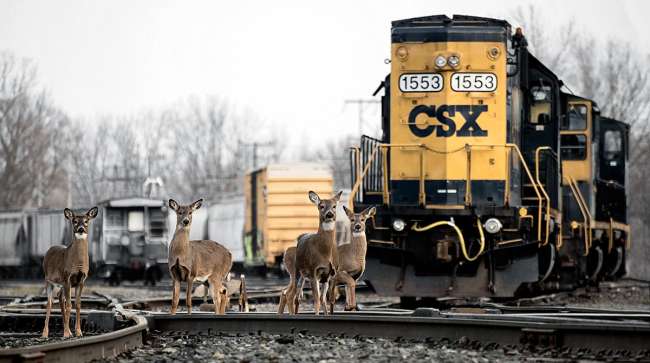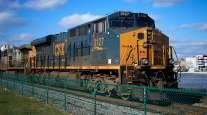CSX Rail Hub in North Carolina Expected to Create 1,500 Jobs

An intermodal CSX rail hub proposed for Rocky Mount will bring 1,500 jobs to North Carolina.
The facility, called the Carolina Connector Hub, is expected to be operational by December 2019.
“Good transportation is essential to economic growth. You can take it to the bank,” said Rep. G.K. Butterfield, (D-Wilson), sponsor of the “Jobs First: Building for Our Future” forum held Aug. 4.
RELATED: CSX doubles down on North Carolina intermodal investments
More than 100 people attended the event at the historic Helen Gay Train Station in Rocky Mount. Built in 1903, the station was acquired by the city of Rocky Mount in 1995 and restored in 2000.
Butterfield thanked economic development leaders for their efforts to bring transportation projects into the region.
“Transportation is so critically important to economic development,” Butterfield said.
Butterfield called the rail hub a key project priority for this region.
RELATED: Changes at CSX bring complaints and slowdown
The Carolina Connector Hub being built along the CSX rail lines will bring an estimated 1,500 jobs throughout the state and will connect eastern North Carolina to the ports.
”That’s a big deal,” Butterfield said. “This is an example of what can happen.”
Butterfield was joined at the forum by Jim Trogdon, North Carolina secretary of transportation.
“This is a region that is unique with opportunities moving forward,” said Trogdon. “It’s a great opportunity not only with this facility and what we do in transportation, but also its proximity to I-95, future I-87, the CSX mainline and what that opportunity has provided for the past years and now the opportunities for years to come with the Central Carolina Express.”
Trogdon said it is a prime example of where the eastern North Carolina region is going.
“This project alone will bring a $270 million investment to Nash and Edgecombe counties, $125 million in benefit to our state economy and $310 million in benefit to the public overall in North Carolina, 300 construction jobs, 300 direct jobs — 150 on-site and then another 150 supporting the Central Carolina Express — and 1,500 jobs statewide overall supporting this operation moving forward,” Trogdon said. “It will take 270,000 trucks off of our roads each year and it will provide us many opportunities once we get it open.”
“So it’s a great opportunity in transportation and freight rail and intermodal service and providing the kind of freight and business that we know will be in high demand in the future,” Trogdon added. “In addition to this but also supporting it, we are in the process of completing something called the Pembroke Switch, which will allow freight to move out of the Port of Wilmington from the east-west line to the north-south line and be able to serve the eastern North Carolina intermodal facility much more efficiently than we can today. We started at the end of July our first daily intermodal service from the Port of Wilmington to the Port of Charlotte with CSX and we believe that will continue to grow the opportunity that this hub will provide.”
Butterfield, who is a regular passenger on Amtrak making the five-hour trip to and from the nation’s capital, encouraged others to use the rail service as an alternative to driving or flying.
“We have got to have bold and visionary investment in infrastructure,” Butterfield said. “The infrastructure challenge that we have in this country is a national emergency.”
According to the Bureau of Labor Statistics, 450,000 North Carolinians are employed in the transportation and construction sectors, Butterfield said.
“These jobs earn an annual average wage of $32,000 to $38,000 a year. We must act on new sustainable long-term solutions to develop an economically competitive transportation system that will create and sustain good-paying jobs,” Butterfield said.
“We must ensure that workers have access to the tools that they need to fill these new jobs. It is far too common that North Carolinians who are eager to work hard and earn a good living are left behind because they don’t have the skills needed to compete in this changing economy.”
In order to connect more workers to good-paying jobs, and close the skills and jobs gap, Butterfield plans to propose a new tax credit for employers to train and hire new workers.
“This initiative will provide a strong economic incentive to invest in and train workers at entry level and all the way up to management,” Butterfield said.
The credits will only be available to companies that employ individuals in full-time jobs.
Distributed by Tribune Content Agency, LLC




